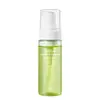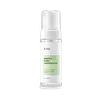What's inside
What's inside
 Key Ingredients
Key Ingredients

 Benefits
Benefits

 Concerns
Concerns

 Ingredients Side-by-side
Ingredients Side-by-side

Water
Skin ConditioningGlycerin
HumectantButylene Glycol
HumectantDipropylene Glycol
HumectantCoco-Betaine
CleansingLauryl Hydroxysultaine
CleansingDisodium Cocoamphodiacetate
CleansingSodium Chloride
MaskingMorinda Citrifolia Fruit Extract
Skin ConditioningSodium Methyl Cocoyl Taurate
CleansingSaccharomyces Ferment
Skin ConditioningCryptomeria Japonica Leaf Extract
HumectantNelumbo Nucifera Leaf Extract
Skin ConditioningSodium Lauroyl Methyl Isethionate
CleansingSalicylic Acid
MaskingHydroxyacetophenone
AntioxidantPentylene Glycol
Skin ConditioningHexylene Glycol
EmulsifyingEthylhexylglycerin
Skin ConditioningAllantoin
Skin ConditioningDisodium EDTA
Tromethamine
BufferingMalachite Extract
AntioxidantCoptis Chinensis Root Extract
AntioxidantGluconic Acid
Pyrus Communis Fruit Extract
Skin ConditioningRosa Damascena Flower Water
MaskingPrunus Persica Fruit Extract
AbrasiveHedera Helix Leaf/Stem Extract
AntimicrobialPimpinella Anisum Fruit Extract
MaskingVanilla Planifolia Fruit Extract
Skin ConditioningCucumis Melo Seed Extract
Skin Conditioning1,2-Hexanediol
Skin ConditioningCaprylyl Glycol
EmollientCitric Acid
BufferingWater, Glycerin, Butylene Glycol, Dipropylene Glycol, Coco-Betaine, Lauryl Hydroxysultaine, Disodium Cocoamphodiacetate, Sodium Chloride, Morinda Citrifolia Fruit Extract, Sodium Methyl Cocoyl Taurate, Saccharomyces Ferment, Cryptomeria Japonica Leaf Extract, Nelumbo Nucifera Leaf Extract, Sodium Lauroyl Methyl Isethionate, Salicylic Acid, Hydroxyacetophenone, Pentylene Glycol, Hexylene Glycol, Ethylhexylglycerin, Allantoin, Disodium EDTA, Tromethamine, Malachite Extract, Coptis Chinensis Root Extract, Gluconic Acid, Pyrus Communis Fruit Extract, Rosa Damascena Flower Water, Prunus Persica Fruit Extract, Hedera Helix Leaf/Stem Extract, Pimpinella Anisum Fruit Extract, Vanilla Planifolia Fruit Extract, Cucumis Melo Seed Extract, 1,2-Hexanediol, Caprylyl Glycol, Citric Acid
Centella Asiatica Leaf Water 69%
Skin ConditioningWater
Skin ConditioningDisodium Cocoamphodiacetate
Cleansing1,2-Hexanediol
Skin ConditioningSodium Chloride
MaskingTea-Cocoyl Glutamate
CleansingHexylene Glycol
EmulsifyingCitric Acid
BufferingPolyglyceryl-4 Caprate
EmulsifyingPentylene Glycol
Skin ConditioningButylene Glycol
HumectantCaprylyl Glycol
EmollientTrehalose
HumectantAllantoin
Skin ConditioningGlycerin
HumectantMelaleuca Alternifolia Leaf Water
AntimicrobialOryza Sativa Bran Extract
Skin ConditioningPortulaca Oleracea Extract
Skin ConditioningPerilla Frutescens Leaf Extract
MaskingAspalathus Linearis Extract
Skin ConditioningCommiphora Myrrha Resin Extract
Skin ConditioningGlycyrrhiza Glabra Root Extract
BleachingEthylhexylglycerin
Skin ConditioningCentella Asiatica Leaf Water 69%, Water, Disodium Cocoamphodiacetate, 1,2-Hexanediol, Sodium Chloride, Tea-Cocoyl Glutamate, Hexylene Glycol, Citric Acid, Polyglyceryl-4 Caprate, Pentylene Glycol, Butylene Glycol, Caprylyl Glycol, Trehalose, Allantoin, Glycerin, Melaleuca Alternifolia Leaf Water, Oryza Sativa Bran Extract, Portulaca Oleracea Extract, Perilla Frutescens Leaf Extract, Aspalathus Linearis Extract, Commiphora Myrrha Resin Extract, Glycyrrhiza Glabra Root Extract, Ethylhexylglycerin
 Reviews
Reviews

Ingredients Explained
These ingredients are found in both products.
Ingredients higher up in an ingredient list are typically present in a larger amount.
1,2-Hexanediol is a synthetic liquid and another multi-functional powerhouse.
It is a:
- Humectant, drawing moisture into the skin
- Emollient, helping to soften skin
- Solvent, dispersing and stabilizing formulas
- Preservative booster, enhancing the antimicrobial activity of other preservatives
Allantoin is a soothing ingredient known for its protective and moisturizingg properties. Because of this, it is often added to products with strong active ingredients.
Studies show higher concentrations of this ingredient can promote wound healing.
Though it can be derived from the comfrey plant, allantoin is produced synthetically for cosmetic products to ensure purity.
Learn more about AllantoinButylene Glycol (or BG) is used within cosmetic products for a few different reasons:
Overall, Butylene Glycol is a safe and well-rounded ingredient that works well with other ingredients.
Though this ingredient works well with most skin types, some people with sensitive skin may experience a reaction such as allergic rashes, closed comedones, or itchiness.
Learn more about Butylene GlycolCaprylyl Glycol is a humectant and emollient, meaning it attracts and preserves moisture.
It is a common ingredient in many products, especially those designed to hydrate skin. The primary benefits are retaining moisture, skin softening, and promoting a healthy skin barrier.
Though Caprylyl Glycol is an alcohol derived from fatty acids, it is not the kind that can dry out skin.
This ingredient is also used as a preservative to extend the life of products. It has slight antimicrobial properties.
Learn more about Caprylyl GlycolCitric Acid is an alpha hydroxy acid (AHA) naturally found in citrus fruits like oranges, lemons, and limes.
Like other AHAs, citric acid can exfoliate skin by breaking down the bonds that hold dead skin cells together. This helps reveal smoother and brighter skin underneath.
However, this exfoliating effect only happens at high concentrations (20%) which can be hard to find in cosmetic products.
Due to this, citric acid is usually included in small amounts as a pH adjuster. This helps keep products slightly more acidic and compatible with skin's natural pH.
In skincare formulas, citric acid can:
While it can provide some skin benefits, research shows lactic acid and glycolic acid are generally more effective and less irritating exfoliants.
Most citric acid used in skincare today is made by fermenting sugars (usually from molasses). This synthetic version is identical to the natural citrus form but easier to stabilize and use in formulations.
Read more about some other popular AHA's here:
Learn more about Citric AcidDisodium Cocoamphodiacetate is a surfactant and helps cleanse skin. It is created from the fatty acids of coconut oil.
Surfactants help rinse oil, dirt, and other pollutants easily from skin. It has a faint fruit-like scent.
Ethylhexylglycerin (we can't pronounce this either) is commonly used as a preservative and skin softener. It is derived from glyceryl.
You might see Ethylhexylglycerin often paired with other preservatives such as phenoxyethanol. Ethylhexylglycerin has been found to increase the effectiveness of these other preservatives.
Glycerin is already naturally found in your skin. It helps moisturize and protect your skin.
A study from 2016 found glycerin to be more effective as a humectant than AHAs and hyaluronic acid.
As a humectant, it helps the skin stay hydrated by pulling moisture to your skin. The low molecular weight of glycerin allows it to pull moisture into the deeper layers of your skin.
Hydrated skin improves your skin barrier; Your skin barrier helps protect against irritants and bacteria.
Glycerin has also been found to have antimicrobial and antiviral properties. Due to these properties, glycerin is often used in wound and burn treatments.
In cosmetics, glycerin is usually derived from plants such as soybean or palm. However, it can also be sourced from animals, such as tallow or animal fat.
This ingredient is organic, colorless, odorless, and non-toxic.
Glycerin is the name for this ingredient in American English. British English uses Glycerol/Glycerine.
Learn more about GlycerinHexylene Glycol is a surfactant. Glycols are a class of alcohols. Hexylene Glycol is a surfactant and emulsifier.
As a surfactant, Hexylene Glycol helps gather dirt and oil on your skin to be washed away.
As an emulsifier, Hexylene Glycol helps keep water and oil together. This prevents them from separating in a product. Hexylene Glycol also thins out the texture of a product by lessening viscosity.
Hexylene Glycol has a small molecular weight.
Learn more about Hexylene GlycolPentylene glycol is typically used within a product to thicken it. It also adds a smooth, soft, and moisturizing feel to the product. It is naturally found in plants such as sugar beets.
The hydrophilic trait of Pentylene Glycol makes it a humectant. As a humectant, Pentylene Glycol helps draw moisture from the air to your skin. This can help keep your skin hydrated.
This property also makes Pentylene Glycol a great texture enhancer. It can also help thicken or stabilize a product.
Pentylene Glycol also acts as a mild preservative and helps to keep a product microbe-free.
Some people may experience mild eye and skin irritation from Pentylene Glycol. We always recommend speaking with a professional about using this ingredient in your routine.
Pentylene Glycol has a low molecular weight and is part of the 1,2-glycol family.
Learn more about Pentylene GlycolChances are, you eat sodium chloride every day. Sodium Chloride is also known as table salt.
This ingredient has many purposes in skincare: thickener, emulsifier, and exfoliator.
You'll most likely find this ingredient in cleansers where it is used to create a gel-like texture. As an emulsifier, it also prevents ingredients from separating.
There is much debate on whether this ingredient is comedogenic. The short answer - comedogenic ratings don't tell the whole story. Learn more about comegodenic ratings here.
The concensus about this ingredient causing acne seems to be divided. Research is needed to understand if this ingredient does cause acne.
Scrubs may use salt as the primary exfoliating ingredient.
Learn more about Sodium ChlorideWater. It's the most common cosmetic ingredient of all. You'll usually see it at the top of ingredient lists, meaning that it makes up the largest part of the product.
So why is it so popular? Water most often acts as a solvent - this means that it helps dissolve other ingredients into the formulation.
You'll also recognize water as that liquid we all need to stay alive. If you see this, drink a glass of water. Stay hydrated!
Learn more about Water